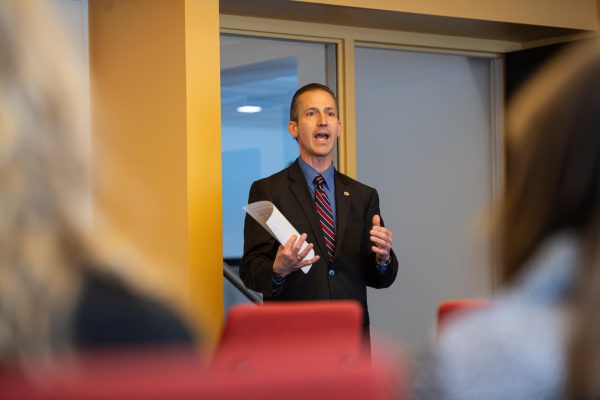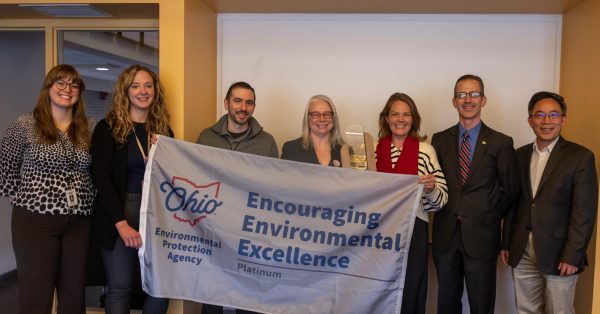By Anthony Zacharyasz and Skyler Edington
Members of the Ohio Environmental Protection Agency traveled from Columbus to Kent Tuesday morning to acknowledge the university’s sustainability and environmental efforts, as both short and long term practices are implemented.
Anne Vogel, the Ohio EPA’s director, awarded the university with a 2023 Encouraging Environmental Excellence Platinum Award (), which recognizes an organization or entity’s achievements in environmental incentives.
“You’re talking about major dollars (in energy savings) on a campus this size with this many people, you’ve got major dollars saved,” Vogel said in an interview with KentWired after the award ceremony. “[The money saved] can go right back into education, facilities and having a good college experience.”
are categorized, from lowest to highest excellence, as Achievement, Silver, Gold or Platinum, which are evaluated among 15 environmental fields, such as economic benefits, recycling programs and energy efficiency, among more, within its criteria.
At the award ceremony, Mark Polatajko, the university’s senior vice president of finance and administration, said the university’s “environmental stewardship philosophy” led to the E3 Award and why some students choose to enroll at the university.

‚ÄúIt‚Äôs a priority for us, as we continue to ensure the culture of continued improvement at ¬È∂π ”∆µ and the careful and responsible management of our university resources and infrastructure,‚Äù Polatajko said.
In an interview with KentWired after the award ceremony, the university’s sustainability manager Melanie Knowles said the charge toward greater sustainable practices across campus can be found in many locations which were highlighted on a tour the university gave to the Ohio EPA representatives after the E3 Award was presented.
Knowles said one of the locations on the tour included The John Elliot Center for Architecture and Environmental Design — the only platinum LEED-certified building on campus. An LEED certification indicates a building’s environmental framework, including ESG benefits, cost-saving mechanisms, among more.
Additional locations on the tour encompassed Crawford Hall (the new home for the Ambassador Crawford College of Business and Entrepreneurship), various electric vehicle charging stations (like those outside Harbourt and Bowman Halls) and Eastway Center, where food waste is ground and allocated to sustainable practices.
Within higher education across the state, sustainable practices are occurring beyond the physical landscape of campuses and also in the classroom, Vogel said.
“We’ve moved past talking about plastic water bottles, like some of the low hanging fruit and light bulbs,” Vogel said. “We’re really talking about a circular economy…”
The ability to be proactive and learn about environmental and sustainable practices comes in different forms, as those avenues cover a wide range of topics, Vogel said.
“What I think is important about when major events, major releases into the environment, major spills occur, is getting the facts,” Vogel said.
Knowles said the education behind how students and the community apply sustainability is still at the university’s forefront.
“It’s important for [college] students coming up to find that credible source of information and make sure you’re educating yourself with data and facts,” Vogel said, “and making decisions based on data, not what feels in the moment.”

Moving forward with facts and figures, Knowles said the university is looking ahead at the next 10-20 years. One change to supplement the longer term sustainability practices included new, electric vans for maintenance crews.
“We literally could not get conventional, gas-powered vans for that purpose,” Knowles said. “The wait to get them was so long and it was a great opportunity for us to switch over to electric (vehicles) for that reason of vehicles traveling around campus.”
Sustainability initiatives across the university are sought out to have a lasting impact and be efficient beyond a short term, Knowles said.
“The biggest thing is we’re thinking longer term, it’s easiest to implement things that have a quick payback…,” Knowles said, “so the question is how we look longer term at how we operate our campus to be cost-effective and good for the environment, along with all the people in these spaces.”
Anthony Zacharyasz is managing editor. Contact him at azachar4@kent.edu.
Skylar Edington is a TV2 reporter. Contact her at sedingto@kent.edu.
